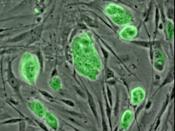Cloning humans is both a moral and ethical issue that society needs to think about, especially with the rapidly advancing technology. In the debate over cloning, there are those that feel the benefits and advances gained from cloning outweigh any ethical dilemmas, while some feel that cloning may be wrong on moral level and would produce ethical issues. Like the idea of genetic determinism, the belief that genes alone determine all aspects of an individual (Hanna 2006). Advancing technology may contribute to preventive medical options, like curing gene disorders, and help people experience optimal health through stem cells. Although science and its discoveries may have some catastrophic effects on mankind, like the loss of biodiversity due to bio engineering of humans, instead of sexual reproduction. The social aspect of cloning may raise problems of human existence and meaning in life.
What is Human Cloning?
The term cloning is used by scientist to describe many different elements of making biological duplicates.
Human cloning refers to creation of a genetically identical existing, or pre existing human being. This is done by growing cloned tissue from that individual. Usually, when scientists clone an animal, they take the nucleus of a cell which contains chromosomes made of deoxyribonucleic acid (DNA) and proteins, and place it into an egg cell from which the nucleus has been removed. The egg cell can then be divided to produce an embryo that develops into an animal (AAAS, 2003). Cloning has brought about two major outcomes, cloning for reproduction, and cloning for the isolation of embryonic stem cells.
Cloning for reproduction involves the technique of transferring a nucleus from a somatic cell into an egg. This is the process in which they used to make Dolly, the sheep. Somatic cell nuclear transplantation cloning involves removing the nucleus of an...


